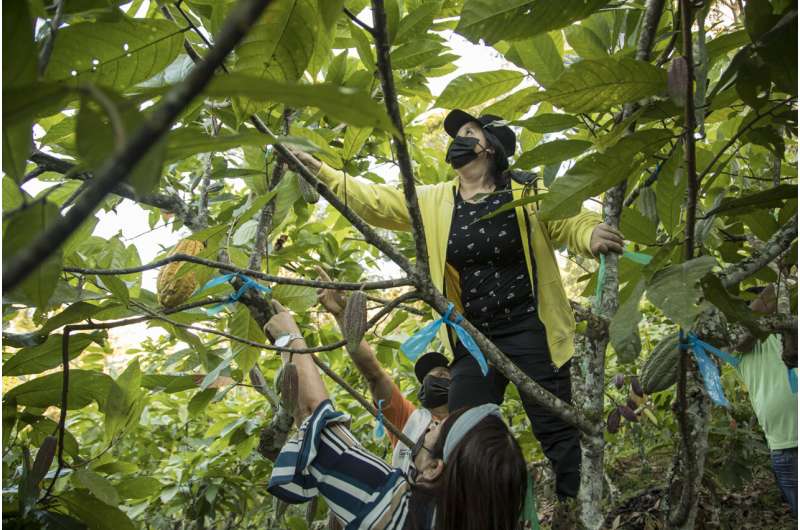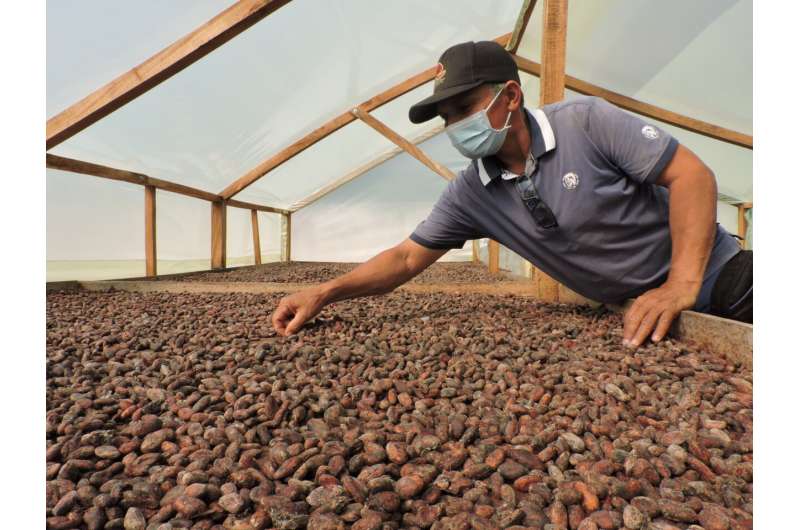This article has been reviewed according to Science X's editorial process and policies. Editors have highlighted the following attributes while ensuring the content's credibility:
fact-checked
peer-reviewed publication
proofread
Sustainable agriculture is building peace in Colombia, finds research

In areas of Colombia once controlled by guerillas, conflicts over land continue and deforestation has risen considerably. But it's in these same areas that researchers have found that farmers implementing sustainable land use systems, like agroforestry driven by cocoa (one of the key ingredients of chocolate), has contributed to reducing conflicts.
In 2016, the government of Colombia signed a peace treaty with the guerilla group Revolutionary Armed Forces of Colombia (FARC, for its initials in Spanish) and in the following years, forested areas formerly controlled by the FARC saw an influx of other illegal actors, contributing to deforestation and renewed instability.
In the first quarter of 2022, 50,400 hectares were deforested across Colombia, an increase over the 45,500 hectares deforested in the same period in 2021, according to Colombia's Ministry of Environment.
In a new paper, "Integrating climate mitigation and environmental peacebuilding objectives through sustainable land use systems: Theory of change and indicators," published in the journal PLOS Climate researchers from the Alliance of Bioversity International and CIAT found that land is an essential natural resource for climate mitigation and peace; commonly connected with sources of greenhouse gas emissions and with drivers of violent conflict.
The researchers held workshops in the César and Caquetá departments (states) in Colombia about sustainable land-use systems (SLUS), in particular, cocoa agroforestry, as an environmentally and economically sustainable activity.
Héctor Morales-Muñoz, a visiting scholar at the Alliance of Bioversity International and CIAT at the time of the workshops and the paper's lead author, said that the results from these workshops are building up evidence for peacebuilding, that is the implementation of agricultural interventions intended to reduce pressure on forests, especially in an area affected by conflict.
"In environmental peacebuilding there's an approach called the contact hypothesis, which says, that contact, or putting conflicting parties together to talk about environmental issues or agricultural practices, typically reduces prejudice, enabling them to have a neutral space for dialogue, for them to start to create a lasting trust," Morales-Muñoz said.

Conflict, land and climate
Morales-Muñoz explained that sustainable land use systems (SLUS) provided a starting point.
"The farmers gained access to knowledge, seeds and different forms of capital and in return they had to conserve part of the forest and this also started a community dialogue process," he said,
"What is also critical, and what no-one was expecting, was that climate mitigation came into the conversation."
Morales-Muñoz said that the diversification in cocoa also protects farmers from getting into illegal spaces.
"Cocoa is a relatively new value chain, so they are more able to negotiate a fairer price for their produce," he said.
In the paper, the researchers found that cocoa agroforestry can contribute to climate change mitigation and deliver co-benefits in creating jobs and diversifying livelihoods; allowing negotiations around the design of farms, including conservation agreements; natural resource governance; and an interchange of knowledge and experience.
One feature of the study was including perception indicators to measure the impacts of cocoa agroforestry in peacebuilding. In a survey of 429 farmer households involved in cocoa agroforestry in Caquetá and 500 in Cesar, the researchers found that participants felt that agroforestry systems had increased the spaces for community dialogue.
A majority of farmers also considered that SLUS decreased disputes over access to natural resources in their environment.
Implications beyond Colombia
Augusto Castro-Nuñez, a senior scientist at the Alliance of Bioversity and CIAT, global theme leader for low-emissions food systems (and leader of the SLUS project which produced the paper) said that the government of Kenya has already shown interest in working with the CGIAR Initiative on Low Emissions Food Systems on approaches for linking climate change mitigation with peace efforts.
"We are planning to scale out the approach to other countries also experiencing conflicts with potential to reduce emissions from the AFOLU (agriculture, forestry and other land uses) sector," Castro-Nuñez said.
Castro-Nuñez explained that the work in Caquetá and Cesar helped inspire the CGIAR initiative called AgriLAC Resiliente, where researchers are working to develop a theory of changes and indicators for linking climate change mitigation and other Sustainable Development Goals (SDGs).
"This is because although a good deal of the countries with potential for reducing emissions from the land sector are experiencing conflict, and therefore peacebuilding is a development priority, some countries have other development priorities such as biodiversity or improved nutrition," Castro-Nuñez said.
More information: Integrating climate mitigation and environmental peacebuilding objectives through sustainable land use systems: Theory of change and indicators, PLOS Climate (2023). DOI: 10.1371/journal.pclm.0000075
Journal information: PLOS Climate
Provided by The Alliance of Bioversity International and the International Center for Tropical Agriculture





















